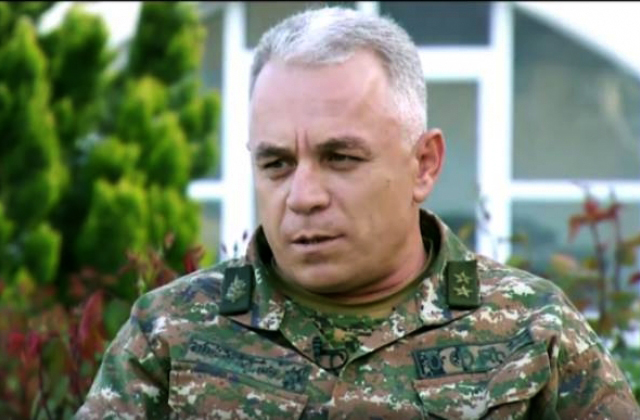It’s Possible to Hit Oil Deposits as well, however, We don’t Consider it Necessary for the Time Being: Levon Mnatsakanyan

Levon Mnatsakanyan, Lieutenant-General, NKR Defense Minister, was guest of Armenia TV’s R-Evolution. Interview of reporter Satik Seyranyan with the Lieutenant-General is introduced below.
Satik Seyranyan: Firstly, let’s look back to the four-day April war. Lots of opinions were heard, however, you talked the least. What has happened? Which was Azerbaijan’s, in particular, Aliyev’s plan? What purpose this aggression pursued?
Levon Mnatsakanyan: What happened overnight on April 2 was the logical development of what was initiated yet in 2014, with more tension in 2015, and in 2016 it was implementation of their plans. Azerbaijan’s military-political authorities were convinced, that NKR issue may be settled only militarily, and decision was made to launch wide-scale attack, from NKR northern borders to the southern, i.e. along the whole Line of Contact. All that pursues the purpose of manifesting intolerance in the political field, showing it to OSCE MG Co-chairs as well. And from military perspective they experimented capabilities of their armed forces, to enlarge those military operations in the future, at the same time, to explain to their people the expenses and wastes, implemented throughout these years.
And according to them, in a period of a few days all those anticipations should have been a reality. Of course, they failed: NKR Defense army not only gave adequate response, moreover, delivered such a blow, that it’ll take Azerbaijani armed forces considerable time to come to its senses. With the moves they perform from north to south, to the frontline and from the frontline to the rear, they once again attempt to show they are yet able to implement former plans, and seemingly, do some actions to prepare for the forthcoming operations.
Satik Seyranyan: Mr. Minister why did they particularly move by those two directions? And up to day it’s not clear which positions have been taken, and how important were they to us?
Levon Mnatsakanyan: All the directions in the battlefield were important. The question is by which level they were crucial—strategic or military? Militarily, maybe, but strategically, surely, both northern and southern directions contain logic. As by attacking from north to south, and recording partial success, they supposed, we’ll concentrate our forces in that direction, and beneficial conditions will be created for them in the central direction, and by that they’d succeed in that direction as well. However, in the period of April 2-5 our operations proved they were mistaken in both cases. They had minor success in the north and in the south, but attacking with all armed forces and with such armaments and take just one line, despite its length, is equal to defeat.
Generally, we didn’t operate all our forces. In the central direction we pushed wide-scale operations of the adversary back only by forces and means on duty. And we introduce the means applied by the adversary both in the north and in the south, as well as in the central direction. Many leading armies maybe would have dreamt of possessing such armaments—from unmanned aerial vehicles (UAV) to large-caliber multiple rocket launchers. And it was not sufficient for them in performing their military duty. Only readiness, arm strength and spirit didn’t allow Azerbaijani armed forces to implement their dirty plans.
Satik Seyranyan: As much as we’re informed, we have destroyed 14 UAVs, which is unprecedented even in wide-scale wars. Such an indicator hasn’t been recorded during different wars.
Levon Mnatsakanyan: You’re right, we destroyed 14 UAVs during those operations, it’s clearly fixed. There are a few more, which I wouldn’t like to touch upon now. We mainly destroyed them by large-caliber machine guns, and some of them—by air defense systems. It gave the possibility to prove once again to Azerbaijani authorities that we implement proper work in that direction as well. These days we experimented means on destroying UAVs, and the result gives hope, that next time instead of 14, 28 and more will be recorded.
Satik Seyranyan: During the four-day war disproportionate arsenal of the Azerbaijani side was being touched upon. Wasn’t it bothering? To which extent are we ready now, if, God forbid, such an attack is recorded?
Levon Mnatsakanyan: I wonder, still there are people concerned with that issue, as it has always been existent; with the type and quantity of its armaments Azerbaijan dominated NKR. The last experience of 1992-1994 also showed, in that period they also possessed an arsenal, which we’d dream of. However, despite that, even at that time NKR defense forces succeeded to destroy and push them back and supplement our arsenal. To some extent, they introduce it for their internal audience, to assure they are capable. Productivity of their application is another point. Any victory can’t be conditioned by the factor of armaments only, human factor is existent as well. Which they completely lack. They lack specialists, they aren’t able to productively handle armaments.
Satik Seyranyan: NKR Defense Ministry released a statement, that gatherings and movements in various directions of the frontline are observed, which provide NKR Defense army a legitimate right to target. Will you introduce what’s going on in the frontline, in particular, regarding gatherings?
Levon Mnatsakanyan: Presently, gatherings are recorded along and to the depth of the whole Line of Contact. Surely, this is under our control. To say that it totally completed its gathering to resume operations, won’t be right, however, they’re implementing it. I assure everyone, if necessary, they’ll be hit, we simply don’t consider it appropriate for the time being, as we have information to be analyzed, we should be once again convinced on further actions of those gatherings: for what purpose and in which directions?
Satik Seyranyan: Speaking of the four-day war, it was called a “non-rifle war,” meaning the armaments applied by the adversary—Smerch, UAVs and etc. Do we have equal arsenal to respond in case such weaponry is used?
Levon Mnatsakanyan: Of course, we have a corresponding arsenal. During these operations the adversary applied armaments shooting at a distance of 100-120 km. Be sure, we have means shooting that depth, and even more.
Satik Seyranyan: There is information, that we can hit oil deposits, and we possess such armaments. Is that really possible?
Levon Mnatsakanyan: Yes, it’s possible, simply we don’t see the necessity to hit the oil deposits now. Our plans mainly include military objects, this is what makes us different from the adversary. They choose civilian settlements and etc., however, throughout this four-day war, we didn’t shell any civilian settlement. Our press service introduced everything.
Satik Seyranyan: Again touching upon the four-day war, those days information was being circulated by Azerbaijani media outlets, that it’s ready to agree on ceasefire for one condition, that the Armenian side promised it wouldn’t attack. What has happened, as that withdrawal was quite unexpected? Was it an implication of mediation of external powers, or of our military operations?
Levon Mnatsakanyan: I consider, if it was mediation of international powers, it wouldn’t attack at all. Surely, the factor of mediation of external powers is available, but, it’s not the main one. The main reason it withdrew from military operations and presently is ready to agree on ceasefire, is its suffered losses. Loss of such troops, which are considered their elite. What does this mean? 052 special intelligence unit, which was fully engaged with the operations, suffered hundreds of losses and they got into panic.
Satik Seyranyan: This war was called “reconnaissance” and in no way it’s comparable with those of the 90s. How well have we been informed on their operations?
Levon Mnatsakanyan: Initially we didn’t have information on operations of this scale. As for the formulation “reconnaissance by war,” surely, such opinion is introduced by some analysts. I disagree with the opinion on reconnaissance by war, as in that period the elite of the armed forces was involved. Does it mean reconnaissance, if in all directions tank battalions and reserves have been involved? It was a wide-scale attack.
Satik Seyranyan: Do you consider resumption of a wide-scale war possible?
Levon Mnatsakanyan: Of course, as armed forces, armaments, ammunition, and the most crucial factor for it—Azerbaijani uncontrollable authorities, are available. It’s expected to resume at any moment. NKR armed forces are completely ready for any operations, to push back any attack, and, if necessary, settle other issues.
Satik Seyranyan: What kind of settlement of Karabakh conflict do you observe?
Levon Mnatsakanyan: Time will show. Surely, it’ll be better, the settlement was peaceful, but if it occurs, we’re ready to reach it through force as well. Which was once implemented.

























